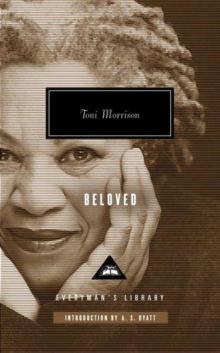- Home
- Toni Morrison
Beloved_a novel Page 3
Beloved_a novel Read online
Page 3
Sethe lay on her back, her head turned from him. Out of the corner of his eye, Paul D saw the float of her breasts and disliked it, the spread-away, flat roundness of them that he could definitely live without, never mind that downstairs he had held them as though they were the most expensive part of himself. And the wrought-iron maze he had explored in the kitchen like a gold miner pawing through pay dirt was in fact a revolting clump of scars. Not a tree, as she said. Maybe shaped like one, but nothing like any tree he knew because trees were inviting; things you could trust and be near; talk to if you wanted to as he frequently did since way back when he took the midday meal in the fields of Sweet Home. Always in the same place if he could, and choosing the place had been hard because Sweet Home had more pretty trees than any farm around. His choice he called Brother, and sat under it, alone sometimes, sometimes with Halle or the other Pauls, but more often with Sixo, who was gentle then and still speaking English. Indigo with a flame-red tongue, Sixo experimented with night-cooked potatoes, trying to pin down exactly when to put smoking-hot rocks in a hole, potatoes on top, and cover the whole thing with twigs so that by the time they broke for the meal, hitched the animals, left the field and got to Brother, the potatoes would be at the peak of perfection. He might get up in the middle of the night, go all the way out there, start the earth-over by starlight; or he would make the stones less hot and put the next day's potatoes on them right after the meal. He never got it right, but they ate those undercooked, overcooked, dried-out or raw potatoes anyway, laughing, spitting and giving him advice.
Time never worked the way Sixo thought, so of course he never got it right. Once he plotted down to the minute a thirty-mile trip to see a woman. He left on a Saturday when the moon was in the place he wanted it to be, arrived at her cabin before church on Sunday and had just enough time to say good morning before he had to start back again so he'd make the field call on time Monday morning. He had walked for seventeen hours, sat down for one, turned around and walked seventeen more. Halle and the Pauls spent the whole day covering Sixo's fatigue from Mr. Garner. They ate no potatoes that day, sweet or white. Sprawled near Brother, his flame-red tongue hidden from them, his indigo face closed, Sixo slept through dinner like a corpse. Now there was a man, and that was a tree. Himself lying in the bed and the "tree" lying next to him didn't compare.
Paul D looked through the window above his feet and folded his hands behind his head. An elbow grazed Sethe's shoulder. The touch of cloth on her skin startled her. She had forgotten he had not taken off his shirt. Dog, she thought, and then remembered that she had not allowed him the time for taking it off. Nor herself time to take off her petticoat, and considering she had begun undressing before she saw him on the porch, that her shoes and stockings were already in her hand and she had never put them back on; that he had looked at her wet bare feet and asked to join her; that when she rose to cook he had undressed her further; considering how quickly they had started getting naked, you'd think by now they would be. But maybe a man was nothing but a man, which is what Baby Suggs always said. They encouraged you to put some of your weight in their hands and soon as you felt how light and lovely that was, they studied your scars and tribulations, after which they did what he had done: ran her children out and tore up the house.
She needed to get up from there, go downstairs and piece it all back together. This house he told her to leave as though a house was a little thing--a shirtwaist or a sewing basket you could walk off from or give away any old time. She who had never had one but this one; she who left a dirt floor to come to this one; she who had to bring a fistful of salsify into Mrs. Garner's kitchen every day just to be able to work in it, feel like some part of it was hers, because she wanted to love the work she did, to take the ugly out of it, and the only way she could feel at home on Sweet Home was if she picked some pretty growing thing and took it with her. The day she forgot was the day butter wouldn't come or the brine in the barrel blistered her arms.
At least it seemed so. A few yellow flowers on the table, some myrtle tied around the handle of the flatiron holding the door open for a breeze calmed her, and when Mrs. Garner and she sat down to sort bristle, or make ink, she felt fine. Fine. Not scared of the men beyond. The five who slept in quarters near her, but never came in the night. Just touched their raggedy hats when they saw her and stared. And if she brought food to them in the fields, bacon and bread wrapped in a piece of clean sheeting, they never took it from her hands. They stood back and waited for her to put it on the ground (at the foot of a tree) and leave. Either they did not want to take anything from her, or did not want her to see them eat. Twice or three times she lingered. Hidden behind honeysuckle she watched them. How different they were without her, how they laughed and played and urinated and sang. All but Sixo, who laughed once--at the very end. Halle, of course, was the nicest. Baby Suggs' eighth and last child, who rented himself out all over the county to buy her away from there. But he too, as it turned out, was nothing but a man.
"A man ain't nothing but a man," said Baby Suggs. "But a son?
Well now, that's somebody."
It made sense for a lot of reasons because in all of Baby's life, as well as Sethe's own, men and women were moved around like checkers.
Anybody Baby Suggs knew, let alone loved, who hadn't run off or been hanged, got rented out, loaned out, bought up, brought back, stored up, mortgaged, won, stolen or seized. So Baby's eight children had six fathers. What she called the nastiness of life was the shock she received upon learning that nobody stopped playing checkers just because the pieces included her children. Halle she was able to keep the longest. Twenty years. A lifetime. Given to her, no doubt, to make up for hearing that her two girls, neither of whom had their adult teeth, were sold and gone and she had not been able to wave goodbye. To make up for coupling with a straw boss for four months in exchange for keeping her third child, a boy, with her--only to have him traded for lumber in the spring of the next year and to find herself pregnant by the man who promised not to and did. That child she could not love and the rest she would not. "God take what He would," she said. And He did, and He did, and He did and then gave her Halle who gave her freedom when it didn't mean a thing.
Sethe had the amazing luck of six whole years of marriage to that "somebody" son who had fathered every one of her children.
A blessing she was reckless enough to take for granted, lean on, as though Sweet Home really was one. As though a handful of myrtle stuck in the handle of a pressing iron propped against the door in a whitewoman's kitchen could make it hers. As though mint sprig in the mouth changed the breath as well as its odor. A bigger fool never lived.
Sethe started to turn over on her stomach but changed her mind.
She did not want to call Paul D's attention back to her, so she settled for crossing her ankles.
But Paul D noticed the movement as well as the change in her breathing. He felt obliged to try again, slower this time, but the appetite was gone. Actually it was a good feeling--not wanting her.
Twenty-five years and blip! The kind of thing Sixo would do--like the time he arranged a meeting with Patsy the Thirty-Mile Woman.
It took three months and two thirty-four-mile round trips to do it.
To persuade her to walk one-third of the way toward him, to a place he knew. A deserted stone structure that Redmen used way back when they thought the land was theirs. Sixo discovered it on one of his night creeps, and asked its permission to enter. Inside, having felt what it felt like, he asked the Redmen's Presence if he could bring his woman there. It said yes and Sixo painstakingly instructed her how to get there, exactly when to start out, how his welcoming or warning whistles would sound. Since neither could go anywhere on business of their own, and since the Thirty-Mile Woman was already fourteen and scheduled for somebody's arms, the danger was real.
When he arrived, she had not. He whistled and got no answer. He went into the Redmen's deserted lodge. She was not there. He returned to the m
eeting spot. She was not there. He waited longer. She still did not come. He grew frightened for her and walked down the road in the direction she should be coming from. Three or four miles, and he stopped. It was hopeless to go on that way, so he stood in the wind and asked for help. Listening close for some sign, he heard a whimper. He turned toward it, waited and heard it again. Uncautious now, he hollered her name. She answered in a voice that sounded like life to him--not death. "Not move!" he shouted. "Breathe hard I can find you." He did. She believed she was already at the meeting place and was crying because she thought he had not kept his promise.
Now it was too late for the rendezvous to happen at the Redmen's house, so they dropped where they were. Later he punctured her calf to simulate snakebite so she could use it in some way as an excuse for not being on time to shake worms from tobacco leaves. He gave her detailed directions about following the stream as a shortcut back, and saw her off. When he got to the road it was very light and he had his clothes in his hands. Suddenly from around a bend a wagon trundled toward him. Its driver, wide-eyed, raised a whip while the woman seated beside him covered her face. But Sixo had already melted into the woods before the lash could unfurl itself on his indigo behind.
He told the story to Paul F, Halle, Paul A and Paul D in the peculiar way that made them cry-laugh. Sixo went among trees at night. For dancing, he said, to keep his bloodlines open, he said.
Privately, alone, he did it. None of the rest of them had seen him at it, but they could imagine it, and the picture they pictured made them eager to laugh at him--in daylight, that is, when it was safe.
But that was before he stopped speaking English because there was no future in it. Because of the Thirty-Mile Woman Sixo was the only one not paralyzed by yearning for Sethe. Nothing could be as good as the sex with her Paul D had been imagining off and on for twenty-five years. His foolishness made him smile and think fondly of himself as he turned over on his side, facing her. Sethe's eyes were closed, her hair a mess. Looked at this way, minus the polished eyes, her face was not so attractive. So it must have been her eyes that kept him both guarded and stirred up. Without them her face was manageable--a face he could handle. Maybe if she would keep them closed like that... But no, there was her mouth. Nice. Halle never knew what he had.
Although her eyes were closed, Sethe knew his gaze was on her face, and a paper picture of just how bad she must look raised itself up before her mind's eye. Still, there was no mockery coming from his gaze. Soft. It felt soft in a waiting kind of way. He was not judging her--or rather he was judging but not comparing her. Not since Halle had a man looked at her that way: not loving or passionate, but interested, as though he were examining an ear of corn for quality.
Halle was more like a brother than a husband. His care suggested a family relationship rather than a man's laying claim. For years they saw each other in full daylight only on Sundays. The rest of the time they spoke or touched or ate in darkness. Predawn darkness and the afterlight of sunset. So looking at each other intently was a Sunday morning pleasure and Halle examined her as though storing up what he saw in sunlight for the shadow he saw the rest of the week. And he had so little time. After his Sweet Home work and on Sunday afternoons was the debt work he owed for his mother. When he asked her to be his wife, Sethe happily agreed and then was stuck not knowing the next step. There should be a ceremony, shouldn't there? A preacher, some dancing, a party, a something. She and Mrs.
Garner were the only women there, so she decided to ask her.
"Halle and me want to be married, Mrs. Garner."
"So I heard." She smiled. "He talked to Mr. Garner about it. Are you already expecting?"
"No, ma'am."
"Well, you will be. You know that, don't you?"
"Yes, ma'am."
"Halle's nice, Sethe. He'll be good to you."
"But I mean we want to get married."
"You just said so. And I said all right."
"Is there a wedding?"
Mrs. Garner put down her cooking spoon. Laughing a little, she touched Sethe on the head, saying, "You are one sweet child." And then no more.
Sethe made a dress on the sly and Halle hung his hitching rope from a nail on the wall of her cabin. And there on top of a mattress on top of the dirt floor of the cabin they coupled for the third time, the first two having been in the tiny cornfield Mr. Garner kept because it was a crop animals could use as well as humans. Both Halle and Sethe were under the impression that they were hidden. Scrunched down among the stalks they couldn't see anything, including the corn tops waving over their heads and visible to everyone else.
Sethe smiled at her and Halle's stupidity. Even the crows knew and came to look. Uncrossing her ankles, she managed not to laugh aloud.
The jump, thought Paul D, from a calf to a girl wasn't all that mighty. Not the leap Halle believed it would be. And taking her in the corn rather than her quarters, a yard away from the cabins of the others who had lost out, was a gesture of tenderness. Halle wanted privacy for her and got public display. Who could miss a ripple in a cornfield on a quiet cloudless day? He, Sixo and both of the Pauls sat under Brother pouring water from a gourd over their heads, and through eyes streaming with well water, they watched the confusion of tassels in the field below. It had been hard, hard, hard sitting there erect as dogs, watching corn stalks dance at noon. The water running over their heads made it worse.
Paul D sighed and turned over. Sethe took the opportunity afforded by his movement to shift as well. Looking at Paul D's back, she remembered that some of the corn stalks broke, folded down over Halle's back, and among the things her fingers clutched were husk and cornsilk hair.
How loose the silk. How jailed down the juice.
The jealous admiration of the watching men melted with the feast of new corn they allowed themselves that night. Plucked from the broken stalks that Mr. Garner could not doubt was the fault of the raccoon. Paul F wanted his roasted; Paul A wanted his boiled and now Paul D couldn't remember how finally they'd cooked those ears too young to eat. What he did remember was parting the hair to get to the tip, the edge of his fingernail just under, so as not to graze a single kernel.
The pulling down of the tight sheath, the ripping sound always convinced her it hurt.
As soon as one strip of husk was down, the rest obeyed and the ear yielded up to him its shy rows, exposed at last. How loose the silk. How quick the jailed-up flavor ran free.
No matter what all your teeth and wet fingers anticipated, there was no accounting for the way that simple joy could shake you.
How loose the silk. How fine and loose and free.
DENVER'S SECRETS were sweet. Accompanied every time by wild veronica until she discovered cologne. The first bottle was a gift, the next she stole from her mother and hid among boxwood until it froze and cracked. That was the year winter came in a hurry at suppertime and stayed eight months. One of the War years when Miss Bodwin, the whitewoman, brought Christmas cologne for her mother and herself, oranges for the boys and another good wool shawl for Baby Suggs. Talking of a war full of dead people, she looked happy--flush-faced, and although her voice was heavy as a man's, she smelled like a roomful of flowers--excitement that Denver could have all for herself in the boxwood. Back beyond 1x4 was a narrow field that stopped itself at a wood. On the yonder side of these woods, a stream.
In these woods, between the field and the stream, hidden by post oaks, five boxwood bushes, planted in a ring, had started stretching toward each other four feet off the ground to form a round, empty room seven feet high, its walls fifty inches of murmuring leaves.
Bent low, Denver could crawl into this room, and once there she could stand all the way up in emerald light.
It began as a little girl's houseplay, but as her desires changed, so did the play. Quiet, primate and completely secret except for the noisome cologne signal that thrilled the rabbits before it confused them. First a playroom (where the silence was softer), then a refuge (from her
brothers' fright), soon the place became the point. In that bower, closed off from the hurt of the hurt world, Denver's imagination produced its own hunger and its own food, which she badly needed because loneliness wore her out. Wore her out. Veiled and protected by the live green walls, she felt ripe and clear, and salvation was as easy as a wish.
Once when she was in the boxwood, an autumn long before Paul D moved into the house with her mother, she was made suddenly cold by a combination of wind and the perfume on her skin. She dressed herself, bent down to leave and stood up in snowfall: a thin and whipping snow very like the picture her mother had painted as she described the circumstances of Denver's birth in a canoe straddled by a whitegirl for whom she was named.
Shivering, Denver approached the house, regarding it, as she always did, as a person rather than a structure. A person that wept, sighed, trembled and fell into fits. Her steps and her gaze were the cautious ones of a child approaching a nervous, idle relative (someone dependent but proud). A breastplate of darkness hid all the windows except one. Its dim glow came from Baby Suggs' room. When Denver looked in, she saw her mother on her knees in prayer, which was not unusual. What was unusual (even for a girl who had lived all her life in a house peopled by the living activity of the dead) was that a white dress knelt down next to her mother and had its sleeve around her mother's waist. And it was the tender embrace of the dress sleeve that made Denver remember the details of her birth--that and the thin, whipping snow she was standing in, like the fruit of common flowers. The dress and her mother together looked like two friendly grown-up women--one (the dress) helping out the other.
And the magic of her birth, its miracle in fact, testified to that friendliness as did her own name.

 Paradise
Paradise Beloved
Beloved Home
Home Tar Baby
Tar Baby The Bluest Eye
The Bluest Eye Jazz
Jazz Love
Love Sula
Sula Mouth Full of Blood
Mouth Full of Blood Song of Solomon
Song of Solomon The Source of Self-Regard
The Source of Self-Regard A Mercy
A Mercy Beloved_a novel
Beloved_a novel